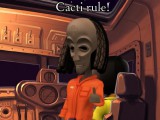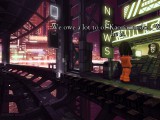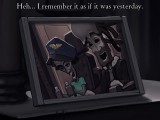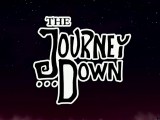 The Journey Down: Over the Edge, 2010’s surprise freeware hit from SkyGoblin’s Theodor Waern returns in all-new commercial form! The ex-Adventure Game Studio title now flaunts its own in-house engine, new puzzles and locations, higher-resolution art and all-new 3D-animated characters and voice acting! In addition to being released on the PC and Mac at GamersGate, Linux, Android and iOS ports are also to arrive shortly.
The Journey Down: Over the Edge, 2010’s surprise freeware hit from SkyGoblin’s Theodor Waern returns in all-new commercial form! The ex-Adventure Game Studio title now flaunts its own in-house engine, new puzzles and locations, higher-resolution art and all-new 3D-animated characters and voice acting! In addition to being released on the PC and Mac at GamersGate, Linux, Android and iOS ports are also to arrive shortly.
The new The Journey Down: Chapter One, then, is the first part of an episodic adventure series in the Monkey Island-Full Throttle-Grim Fandango mode - as good a trinity of influences as any! The game tells the story of Bwana and Kito, two adopted brothers, who have been left in charge of captain Kaonandodo’s “Gas and Charter” enterprise ever since his sudden disappearance. The brothers are however left hanging high and dry after the mysterious Armando Power Company initiates a dastardly money grab - just as a damsel in distress appears knocking on the brothers’ proverbial door!
 The original indie release was a critical hit. “Over the Edge” was one of the - if not the - best medium-length indie adventures of 2010. I personally thought as much. Two years after the fact, however, reviewing the all-new remake, seems oddly unfair as well as difficult: What was the feature, exactly, that made the original so very enjoyable, and more importantly, how to once again accurately convey it?
The original indie release was a critical hit. “Over the Edge” was one of the - if not the - best medium-length indie adventures of 2010. I personally thought as much. Two years after the fact, however, reviewing the all-new remake, seems oddly unfair as well as difficult: What was the feature, exactly, that made the original so very enjoyable, and more importantly, how to once again accurately convey it?
Was it the game’s wistful nostalgia combined with surprisingly effective comedic relief, or the “Fandango”-like injection of the African Chokwe/Makonde masks that so successfully gave the game its unique touch? Or the stirringly sharp hand-painted 2D backgrounds? Or the expert pacing and flow? The carefully-crafted, balanced puzzle-solving? The jokes?
Looking back, in my original review, I did claim The Journey Down’s primary feature to be its visual direction. This fact should be altogether apparent just from screenshots alone, however, which makes me want to revise my previous statement, instead focusing on the one thing every prospective Journeyman and -woman should know:The Journey Down is an infectious adventure.
Its excitement is contagious, its joys palpable. When brother Kito exclaims, at the very beginning of the game, “Let’s mess it with man!”, you simply can’t not agree! Let us indeed! The game’s register, of both humour and writing overall, is bubbly, genuine, and all-around excited!
This is also why reviewing the remake feels to me so much like a tough nut to crack; adventure games are a particularly agonizing bunch to replay (even if we do it all the time), and with the game’s experiential flow somewhat broken by foreknowledge, it’s almost impossible for me to accurately recapture the joyful feeling that is by the game’s expert use of puzzle flow.
Above all, the game is a coherent whole, a fully realized project, and one that begs to be played, experienced!
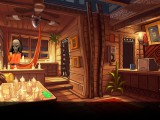 It should come to us as no shock that the game is being released on a plethora of platforms, as adventures have always been largely platform-indepedendent, with most Sierra and LucasArts titles familiar to owners of all kinds of platforms, all the way from the C64 to the Sega CD! But with the recent influx of adventures on phones and tablets - in part thanks to Telltale - what does it mean for The Journey Down to run on such a wide variety of rather different platforms (iOS and Android included)?
It should come to us as no shock that the game is being released on a plethora of platforms, as adventures have always been largely platform-indepedendent, with most Sierra and LucasArts titles familiar to owners of all kinds of platforms, all the way from the C64 to the Sega CD! But with the recent influx of adventures on phones and tablets - in part thanks to Telltale - what does it mean for The Journey Down to run on such a wide variety of rather different platforms (iOS and Android included)?
It means that the game now runs on SkyGoblin’s own purpose-made proprietary engine and the game’s interface is based on drag and drop! The forthcoming tablet release surely influenced this feature - not often seen in adventures - but is not at all a negative one. The inventory itself is icon-based, and features some combination puzzles to go. Even for a hard-nosed PC player, the controls are intuitive, as you can abort movement (although double-click exit is still missing) and the game is quick and sleek to control.
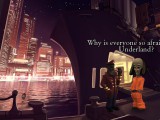 The cursor changes to a red arrow to help locate entrances and exits. This is helpful, given that the game is portrayed in relatively dark tones and hues, making it sometimes difficult to locate hotspots - something that may be further exacerbated while playing on a tablet. Hopefully a brightness slider will be available by then. Perhaps the game’s future tablet origins have also to do with limiting save game slots just to three? (Though even this is an improvement from the original, given the AGS version only has one. Why limit this on the PC, though? We demand save games!).
The cursor changes to a red arrow to help locate entrances and exits. This is helpful, given that the game is portrayed in relatively dark tones and hues, making it sometimes difficult to locate hotspots - something that may be further exacerbated while playing on a tablet. Hopefully a brightness slider will be available by then. Perhaps the game’s future tablet origins have also to do with limiting save game slots just to three? (Though even this is an improvement from the original, given the AGS version only has one. Why limit this on the PC, though? We demand save games!).
On the outset, the game’s new engine (by Johansson & Larsson) seems tailor-made for laptop gaming, and works especially well in widescreen resolutions, a fact that further emphasises the game’s beautiful scenery. My review copy, however, stole more than half a gigabyte of memory, and would intermittently jitter and sputter in windowed mode. According to the team, animations run at 15fps, which additionally makes some of the game’s animations seem a little choppy at times. Choppy or not, the all-new 3D animations are for the most part professional, and the colourful cast more than makes up for whatever slight omissions there may be in terms of polish. Not to mention some of the game’s wicked animated sequences, which bode well for future episodes.
The game is an intriguing hodgepodge of genre. As is perfectly evident just from the game’s exposition, The Journey Down blends a multitude of generic modes - beginning with the classic bildungsroman (adoption, abandonment, character growth), comedy, crime, mystery, action adventure and so forth - all in a very naturalized, effortless way. At no point does the game’s storytelling and writing feel forced, and even when a potential pitfall occassionally emerges, the game’s designers are more than willing to take shots at the admittedly silly conventions of their chosen genre.
The game provides plenty of moments for smiles, even laughter, yet also provides moments of introspection and nostalgia. Never does the game feel like it’s stepping too far beyond its strangely loose, almost undefined boundaries!
The transition from 2D to 3D models means the retro-riffic two-dimensional charms of the original are, of course, gone. Gone! Those of the cast, however, are not, and even the most hardcore of adventurers would probably admit that the new 3D graphics do not in any way pale in comparison, even if Waern is above all an expert painter, as evinced by the breathtaking backgrounds out and about.
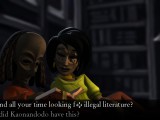 The all-new voice acting is, on the whole, solid. Anthony Sardinha’s Bwana is especially good, as is David Dixon’s Kito, a special favourite of mine out of the extremely diverse cast of characters. Scott Stoked (the Dockmaster) and Cassie Ewulu (Lina) also do a fine job of conveying their characters. For an indie production, the voice cast is top-notch, and minor ups and downs in the recording quality and/or volume are easily forgiven and forgotten as they come to pass. What I really enjoy is the cast’s dedication to the characters’ personalities - each and every character comes with their own manner of speech, each with their own little quirks and stylings.
The all-new voice acting is, on the whole, solid. Anthony Sardinha’s Bwana is especially good, as is David Dixon’s Kito, a special favourite of mine out of the extremely diverse cast of characters. Scott Stoked (the Dockmaster) and Cassie Ewulu (Lina) also do a fine job of conveying their characters. For an indie production, the voice cast is top-notch, and minor ups and downs in the recording quality and/or volume are easily forgiven and forgotten as they come to pass. What I really enjoy is the cast’s dedication to the characters’ personalities - each and every character comes with their own manner of speech, each with their own little quirks and stylings.
So you’ve played the original, and now considering buying this HD upgrade/remake? Do be “warned”, then, that this is, for all intents and purposes, the same excellent game - if only in a fancier suit yet. For Mac/Linux gamers, or iOS/Android tablet owners, The Journey Down will be some of the best adventuring your money can buy. PC players already familiar with the AGS original may feel a moment’s hesitance, sure, but then again, it’s not as though they’ve invested money into the freeware version in the first place. Gosh, if only there were a season-long preorder subscription model of some sort, à la the Dream Machine on Steam!
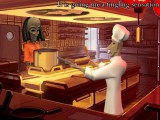 For players unfamiliar with the freeware version, in any case, The Journey Down stands out of the crowd: In an era where most commercial adventures border on unwitting, garish pastiche, and are burdened with nonsensical puzzles and writing, The Journey Down comes off as a hard-working indie success, and is living proof that comedy can still be an earnest, gripping, exciting mode in adventure games.
For players unfamiliar with the freeware version, in any case, The Journey Down stands out of the crowd: In an era where most commercial adventures border on unwitting, garish pastiche, and are burdened with nonsensical puzzles and writing, The Journey Down comes off as a hard-working indie success, and is living proof that comedy can still be an earnest, gripping, exciting mode in adventure games.
It also proves, in a big big way, that its African look and generic homages are not mere gimmicks. Simply put: The Journey Down is classy adventure gaming. Period. SkyGoblin have posted a list of various digital download shops that carry “Chapter One”, and finally, if you’re interested in how the game got here, you can refer to our 2010 interview with Waern, and a detailed review of the original AGS version can be found here.
Note: A review copy was provided by SkyGoblin for the purpose of this review.
